2015 has been quite the ride so far for bassist/guitarist/songwriter Marc Walloch.
With a career that includes stints playing guitar for Juliette Lewis, and several years rising through the alt-rock ranks as a founding member of Company of Thieves — the Chicago band that launched powerhouse vocalist Genevieve’s career — Walloch is currently on the road with electronic-rock juggernaut AWOLNATION as their touring bass player.
I caught up with Marc in between sold-out shows for a candid chat about what it’s like to play with AWOL, his gear, his writing process, and his soon-to-be-released solo debut EP, Through the Seasons.
zZounds: Tell me how and when you got this gig playing bass for AWOLNATION in the first place, because it’s so different from a lot of the stuff you’ve done in the past.
MW: Well, I got the audition through my old tour manager and sound guy, who used to work with AWOL, doing monitors for a while. I came on board in late February. Since February, we did a few fly dates, and then we did Jimmy Kimmel, and then we did two and a half weeks in Europe, and then since then, every single weekend we’ve been doing radio shows, flying every weekend up until this tour started at the end of May.
zZ: I’m curious about the rehearsal process for AWOLNATION. What is it like to turn a synth-based electro band back into live drums and bass?
MW: For me, when I was learning the songs for auditioning, there’s not a lot of percussive bass lines. A lot of it’s like held-out sustained synths and stuff like that. So I just naturally started Motowning it up, which is weird, but it’s just what I end up doing!
Instead of being another bass on top of the synth bass, I try to use sounds that become one with it, because if you’re going to use both, I feel like I should just blend in with the synths. I used a lot of gated fuzzes — like vintage Big Muff fuzzes and things like that. When I went to rehearsal, I started playing like that even more so, because when you get a live drummer doing his own thing with a human feel, it’s not as stiff as the recordings…I’m a human being, so it doesn’t need to sound just like the robotic production; let’s just play the song. And I gotta say it’s really refreshing, because I think there’s a lot of really cool production styles in all genres of music right now that are really strong — but the problem I see is when these bands play live, they’re so attached to what they did in the studio that they think it’s gotta sound like that live, and then you get all these bands that are like, two guys and a bunch of tracks. And it doesn’t sound good — I feel like I’m getting cheated from a live experience. I wish that people would learn that performance is an art that’s separate from production. It’s okay if you record a song — as long as the song’s good, now let’s just go play it and develop it and bring it to life. And AWOL definitely does that. They’re definitely into both sides, and they separate them well.
zZ: What’s it like to work with Aaron Bruno, the artist at the core of AWOLNATION?
MW: He’s the easiest person to work with. He has a lot of respect and trust for everyone, to allow the band to bring their talents to his songs live…for me to have the freedom to just make up bass lines that don’t exist — I’ve never met anyone like that. There’s certain things — in [keyboardist] Kenny [Carkeet]’s world, you want to get the right samples triggered, and the right bass synth sounds, so they worked in the rehearsal space for a few weeks just getting all that dialed in — and getting guitar sounds right.
zZ: Regarding the AWOLNATION single “Hollow Moon,” you said “I don’t know what the chorus is on this song,” and you meant that as a good thing.
MW: You know, I’m so used to the songs by now that I don’t really think about them from an outside perspective, but when I was watching our Conan performance, it gets to the end of “Hollow Moon,” and it’s a straight-up VFW Hall hardcore breakdown in a pop song. I’m just like, “How did Aaron Bruno get away with pulling out a hardcore breakdown on national television?” Let alone on national radio — and having it be the number one song? How do you do that? No one’s ever done that, and it’s pretty crazy to see. I think it says a lot about not only him as the artist, but the public, and the people who are in radio — people who are accepting this and allowing it to happen and giving it a chance. I feel like it’s a really exciting time for music.
Writing & Recording Marc’s Solo EP, Through the Seasons
zZ: Speaking of exciting, I want to talk to you about the long-anticipated Marc Walloch solo album.
MW: Is there anticipation outside of myself?!
zZ: Yes. It’s hotly anticipated!
MW: I think I had so many long years with my band [Company of Thieves] that I just loved everything about, and it felt so right for so long, that I put everything into that, every single minute of every day for 7+ years. And I feel like when that imploded, and the way it imploded, it just kind of was a shock. And I needed time to get myself healthy, emotionally and mentally, as a human being, before even thinking about music. I really needed to take care of myself and become whole again. So that’s why it’s been taking so long!
I took a while just not recording or writing music, and then finally I got to that point where I was like “You know, I could depend on somebody else, and hope to find a band, or hope to find a singer to sing songs” — and that forced me to be like, “Well, that’s bullsh*t. I can’t keep being dependent on situations, because when they fall apart, you’re left with nothing.” How do you become your own source of dependency?
And that forced me into singing. I’ve always been singing when I write songs, but I never felt like that was my voice. I always felt like guitar was my voice of expression, so I didn’t really get too amped on singing. So I just recorded some demos, and I showed a friend of mine that I’d just met at the time — a producer in Chicago, Scott Stewart, who lives in L.A. now. I showed him this demo of one of my songs, and I was kind of nervous because it was someone I didn’t know that well, so I knew they weren’t going to bullsh*t me, and I was curious what they would think, because I didn’t think anything of it. And he just flipped out over the song I showed him. He made me play it for him like three times in a row. He’s like, “I can’t believe that’s you! That’s you singing? I want to record you!”
It made me think of the early Company of Thieves days. The more you get nervous, or don’t think your sh*t’s good, you keep it hidden — and the less opportunity and the less feedback you’re allowing yourself. The second we started playing open mics with the band, is when we built up our confidence to do more. And this was kind of like that. I showed it to one friend, and he liked it enough to make me feel like “Okay, maybe I’m just crazy and I should just record some songs,” and over a long period of time, we spent a few months recording, and then I had to move to L.A. because I started playing guitar for Juliette Lewis, so that kind of split up our time, and I was working weird jobs to try to make money to record it, so that broke up a lot of the time too, for financial reasons. And then Scott came out to L.A. to finish the stuff we worked on, and then he ended up moving to L.A. a few months later, and then we recorded a few more songs. So it’s just been like, because there’s no plan, I kind of had the freedom to just keep recording songs.
It was kind of a nice change of pace from what I’m used to. Usually a band spends a month making a record, and that’s it — and they have all these goals, and a timeline — and I just had none of that. I was just like, “Well, I’m trying to get some other stuff off the ground — I want to play with people, I want to write with people, I want to do commercial music. I’ll just keep recording these songs as we go.” They kind of transformed into this really great representation of this chapter; this transitional period in my life. And now it’s interesting, because I listen back and I’m totally in a different place. It just makes me feel like I’ve evolved and moved on to a new chapter, so I’m really stoked about that.
zZ: When you write and record an album over a year, how do your skills sharpen as a songwriter, producer, or singer? What have you noticed that’s changed?
MW: Even before recording this, I’ve been really getting into the art of honoring storytelling, and the flow of a song. Not for any “Ooh, it’s got to sound like this to be on the radio” reason — just as a listener…how do you tell a story and convey an emotion to someone who’s not experiencing it as you? You have to do it in a way that’s going to be right for that person’s brain, so it’s very psychological. Which I’m, like, a nerd about. I feel like if I wasn’t into music, I’d be into something with psychology, and I see that translate all the time with music.
So as we were working on these songs, I would be almost obsessive: “This is happening too long; we gotta cut this out. We should add a new sound in here; this is boring me.” And not having a bunch of other people collaborating, for the first time, was kind of nice for a change. Sometimes you have an idea, and you haven’t figured out how to execute it, but you know it’s a great idea. And then there’s three other people’s ideas that take it down this path, and you realize, “Wait, I forgot what the original idea was now.” It gets off track a little bit sometimes. It was kind of nice to just have the time and freedom to flesh out ideas that I was feeling, and work with one person instead of five. Even though I love collaborating, and I would love to do that again, this was was different for me, so it was nice to experience that.
It helped as a singer, too. I was learning how to use my voice and figure out what the strengths were. You know, I have a very limited vocal range — and some of my favorite singers do, too. So instead of feeling down about it, and not singing with confidence, I remembered my favorite singers aren’t singers — they’re just people who have an interesting character to their voice, and they sound very raw and real and believable. And I kept channeling that, for confidence. I also built the whole production around the vocal, too! There were times with Company of Thieves where I didn’t want the records to sound the way they ended up, because it didn’t properly fit around the vocal. And this time, I had the freedom to make all those decisions. That’s why the production on my record is very minimal and very small. Even though it’s layered, it’s not like the big drum room sound, and big layered guitars, because my voice would get swallowed up.
My favorite singers aren’t singers — they’re just people who have an interesting character to their voice, and they sound very raw and real and believable.
zZ: It’s still a collaboration — but it’s a collaboration with yourself. Yourself of 6 months ago, yourself of a year ago — when you first got this idea. If you have that original idea, and you’re able to capture it in whatever form — then you’re able to come back to it later and hone it.
MW: Exactly. Sometimes it just needs time…you’re like “I have this thing, but I don’t know how to articulate exactly what I’m saying.” Sometimes you have an idea that you feel in your gut, and you’re like “I think this could be cool,” but you need to experiment and play with it a little bit before you fully understand that idea yourself. It just takes a little time, and then you figure it out. And sometimes bouncing it off of one person, like my producer, was better than having a room of five or six people.
zZ: Too many cooks, right? How did you decide on a title for your EP?
MW: It’s called Through the Seasons because of how many months have passed while doing it! Even though it’s a big window of time, it’s a very cohesive, consistent chapter of my life. Throughout the entire time it was being made, I was in that period of my life that these songs are about. So I feel stoked about how it captures that time and represents it very accurately. Also, I feel like I have a lot of peers, and we’ve all hit this age, this point where we’re either satisfied with what we did in our early 20s and we’re stoked — or something either fell apart, or nothing fell apart and people are just not really content. I get that feeling a lot with everyone that’s around my age in their late 20s. It’s like this weird transitional period that you find yourself in. It’s like, “How do I get back on track where I feel content?”
Even though this record sounds dark and melancholy, and some of the songs are about darker things, they’re all about having this hopeful sense of faith and positivity and finding your light at the end of the tunnel. I feel like that’s what I’m most stoked about: the juxtaposition of having all these dark topics and dark sounds, but they have such a hopefulness in the lyrics. That’s all you really have at the end of the day, when you’re in a weird period of your life: You can either be negative and complain and feel entitled to a better life, or you can put out a much better positive energy into the world — and that’s kind of what I was doing when writing these songs. And now I can’t even relate to where I was when I wrote those — so that’s great!
zZ: Isn’t it funny how you can write a song, and it almost seems like it came from somewhere outside of yourself?
MW: Yeah! It’s funny, too — when you record vocals, you don’t really think anything of it; you’re like “I’m just trying to get a good take.” And then you listen back a week later, and you thought it wasn’t the greatest take you can do, and you think “Wow, I think something got captured that represented an actual mood I didn’t even know was happening at the time — and it sounds so intense and raw.” That happened a lot. I would call Scott, my producer, and be like “I want to redo vocals and try a few more takes,” and he’d be like, “Well, have you listened to it?” And then I listened to it. I’d be like, “Holy sh*t, what the hell was happening when we recorded?” I feel the same feeling listening to some of the takes as the times that made me write the songs! And that’s the biggest goal with me with vocals, with anybody — you’re trying to convey a mood to a listener, to get them experiencing what you’re experiencing in your life. How do you get them to feel that? The only way to do that is for your producer to capture some kind of energy or mood that’s happening while stepping up to the mic to record it.
That’s the biggest goal with me with vocals…you’re trying to convey a mood to a listener, to get them experiencing what you’re experiencing in your life.
zZ: What instrument do you usually write on?
MW: Acoustic guitars — but I actually feel like I’ve hit a wall with picking up an acoustic guitar and writing a song. Right now I feel like I really want to get into building moods — like a beat, and some cool soundscapes, some ambient stuff, and some cool chord changes, and just write melodies over something that I build in Pro Tools. Right now, I just want to create new stuff that’s different, and it’s kind of hard to have imagination sometimes when you pick up an acoustic guitar and just start fingerpicking “sad ballad stuff.” I don’t want to do that! I need to find a new way to develop something and get inspired from that to write melodies and songs. I’m going to start this process with just fooling around in Pro Tools and just building some ideas and trying to sing over that to build the songs.
zZ: Have you been recording in your home studio, for the most part?
MW: We only did two songs there, because we had the whole record pretty much finished and mixed — but I had these two other songs that I really wanted on the record. I knew that Scott was going to be moving into my home last fall, so we kind of put a few songs on hold — and then we recorded them there. It’s cool because my neighbor is Jay McMillan, who’s the drummer from Andrew McMahon and Jack’s Mannequin, and I used to tour with those guys. He ended up moving some of his stuff into the studio. It’s kind of like this communal studio now, with a bunch of people. So he played drums on the song “Seasons.” And then I was working some weird soft job when I moved to L.A. — I was a Lyft driver — and I ended up meeting a bunch of people through that. One of the guys I met was the trumpet player from Capital Cities, Spencer Ludwig. So he’s playing trumpet on some songs, too. It’s really cool that’s it’s kind of a collaborative record in that sense, just with people I was meeting at the time.
Marc Walloch’s Gear for Writing and Recording — In the Home Studio, and On the Road
zZ: Tell me about what you have in your setup at home.
MW: Instrument-wise, we Craigslisted everything when we moved in. We found a 1930s Baldwin upright piano for like, a few hundred bucks. We also have all my guitars, a Fender Tweed Deluxe amp — and I just got this Yamaha CP70 electric piano from a friend that just gave it to me. It’s the Fleetwood Mac keyboard, basically!
zZ: So you’ve got all these vintage instruments. What about the high-tech stuff — what are you recording into?
MW: We’re recording into Pro Tools. One of my roommates and partners uses Ableton a lot, too. A lot of the preamps are stuff that Jay, the drummer from down the street, brought over and donated — four API pres, two Quad Eights from the Motown control board — so it’s awesome. If you’re going to DI bass, it’s the fattest, cleanest, most powerful signal I’ve ever heard for a DI. And then he’s got two Neve preamps — that’s all we use for kick, and snare, and vocals, so it’s really cool that we have that. Then we rigged up a snake that goes basically through my house out into the garage, and there’s a room in the garage that’s already finished. We do all drums and amps out there, so it’s able to record a lot of separation. It’s the house where we live, so we could be recording drums or vocals late at night, and everyone else could be watching TV or going to sleep, and you don’t even hear it. So it’s kind of nice!
zZ: Why would you ever go to another studio? It sounds great!
MW: It’s nice for us. Sometimes our friends who helped out with the studio — they’ll have sessions, and they’ll come by and bring people over and we’ll have a barbecue. It’s nice to have somewhat of a communal vibe, where it feels like those Motown days — everyone’s on each other’s songs, everyone’s helping each other out — but at the same time, we don’t want it to grow into this big commercial studio space, because we sleep there too, you know? But we rent the studio sometimes, and can be hired for various work.
Check out Marc’s studio at TheKinsonic.com
zZ: What do you write with when you’re on the road, when you can’t carry all that stuff with you?
MW: The Baby Taylor acoustic guitar has been great, because it’s not something you have to worry about breaking, or getting lost, or being too big to lug around. I could bring it to the beach, or to a park, or up to a hotel room, or in the green room. The size of it is not ideal for practicing guitar — since it doesn’t feel like a real full-size guitar — but its biggest benefit is being able to bring it everywhere easily for writing. I actually was working on some songs for a potential indie movie that some people are doing in L.A., and luckily I had the “baby synth” — the M-Audio Keystation Mini 32 MIDI controller. With that and the Baby Taylor acoustic guitar, I was able to bust out demos in my hotel room really quick and submit it to this movie — and they ended up liking my stuff. I was like “Awesome! I just did this really quick, because I have this stuff and I’m able to do it!” Whereas I could’ve been like “Um, could you wait a few weeks til I’m home?” and miss out on the opportunity completely.
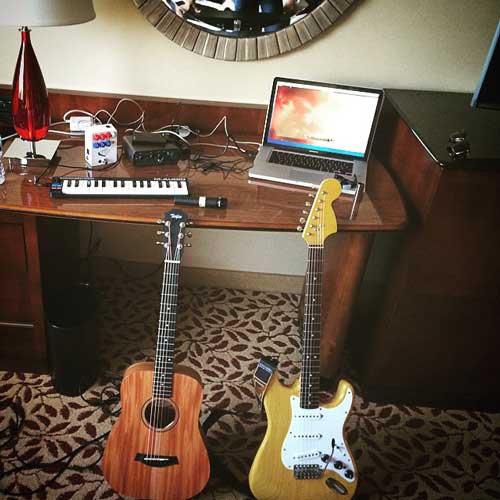
Hotel room recording rig: Mahogany Baby Taylor acoustic guitar, mini Strat, M-Audio Keystation Mini, and a laptop running Pro Tools.
zZ: Do you have Pro Tools on your laptop?
MW: Yeah, I have Pro Tools on my laptop, and another thing I’ve been using is the JHS Colour Box preamp pedal, which is basically an exact replica of those Neve pres I have at my house. I could literally run vocals through it, or guitar DI, or even synths and stuff like that. It definitely helps to go through the Colour Box into the Mbox, and just get a bigger, cleaner sound. And it’s the size of a pedal, so it’s just easy to bring around. I actually have one of those on my bass board right now. It has so many different sounds to it — you can use it as a pre, or you can use it to get that DI guitar sound that Jon Brion uses a lot, or George Harrison used a lot — just kind of overdriven DI guitar. And then you can crank it and make it sound really fuzzed out, but it’s got this gate that happens when it’s that fuzzed and that saturated. So when we play “Sail,” I’m usually just using that to blend in with the synths. It’s got a really heavy sound, but because it’s gated, it cuts off all the feedback noise that would happen after the note.
AWOLNATION’s Live Bass and Guitar Rigs
zZ: For your bass rig on tour, do you actually have an amp back there?
MW: There’s no amps, actually. Guitar’s actually being run on a futuristic, state-of-the-art Kemper amplifier modeler.
zZ: Okay, tell me about [AWOLNATION touring guitarist] Zach Irons’ rig.
MW: I’m like a purist, and I love real amps moving air on stage, but the Kemper Profiler — these things blew my mind. They’re unreal, especially for this kind of band. You listen to Aaron’s production, and he’s got a very distinct production style. It’s very minimal and robotic and powerful in that way. And then when you go to the stage and develop the songs live, it’s definitely more of an organic rock band, but we still want to do it in a way that’s very powerful, like the record is. Not having a mic on a speaker with the sound going everywhere, and air transferred everywhere — we’re getting the full, 100% direct signal of these Trent-Reznor-like guitar tones. And it gives front-of-house complete control. The Kemper is basically all these different modeled amps and different sounds that you can save and put in your banks on the MIDI board on your pedalboard, and it’s also got effects and octaves that you can put on every single patch. There’s that song “Hollow Moon,” where there’s really heavy chords trying to fit in with those fuzzy synths on the verses. You know that second verse, where it’s like a call-and-answer thing? The chords are really heavy and then it goes to this clean delay lead — usually you’d have to hop around several pedals to make that switch in a millisecond.
zZ: The pedal tap dance…
MW: Exactly. So you hit one little button and it switches, but the delay will still carry over. My way of getting around that before was, I would switch to my new tone first, and then kill the delay. But you don’t want to be dealing with that kind of timing! So it’s been really convenient to be able to go through several pedal changes with one switch. And the sounds on that thing are really awesome.
zZ: It seems like there are two schools of thought: guitarists who love the old school, and people who are into modeling amps.
MW: And maybe it’s the scenario that I’m experiencing it with, because AWOLNATION’s got such a robotic production on the record — playing live, it just seems cool to have these Nine Inch Nails guitar sounds, that are all DI. But maybe if I was in a blues band, or more of an authentic rock’n’roll band, maybe I wouldn’t want to use the Kemper. Or maybe I’d find the Kemper still rips!
zZ: Do you and [guitarist] Zach both have a Kemper modeling amp?
MW: I don’t. But the band just bought bass profiles, and the tech was just asking me, “I think we should try to use those at some point.” I’m going to try to play around with it. Right now I’m just using my whole pedal chain going out into the Tech 21 SansAmp DI, which is cool. It gives it a mid-bite, warm, round, bass-amp sound — because I’m only [monitoring with] in-ears. The SansAmp gives it the sound of a round, deeper amp, instead of that fake, plasticky, thin DI sound I’d get if I wasn’t using anything before the DI.
zZ: What do you have on your AWOLNATION pedalboard?
MW: I got this ’73 Rams Head Big Muff replica — that’s all the overdriven and fuzz stuff. Then it’s like a Boss Super Octave pedal, then the JHS Colour Box. There’s this company Smallsound/Bigsound — Brian, from the band Cymbals Eat Guitars — he does awesome pedals, and he’s got this fuzz pedal that’s like, when you dial in your sound, you get it to be like an overdrive or a fuzz, and then there’s another button you can trigger after it that basically heightens the top end, the gain, and it also gates everything. So you can have this overdriven light fuzz, and then you hit that thing on, and then it really pops out at you, but it also doesn’t get noisy because it’s got the gate on it. Sometimes for overdrive I’ll use another one of his pedals called the Mini, and it’s just like a really light fuzz overdrive sound. Oh, and there’s this company called Stone Deaf — it’s a friend of our front-of-house guy from England — they gave him this EQ pedal called the PDF-1 that’s unreal. It’s helped our front-of-house guy separate me from our synths in keyboard world. It boosts the low end a little bit so it doesn’t get lost, and you can pick what frequency you want to boost or lose. It also has a very pointy peak, or a wide one — adjustable Q — it’s kind of like editing EQs in Pro Tools, on a pedal. It just has everything you could want from EQ in a pedal form. So it’s helped me boost things and cut things to help separate me from the keyboard world.
zZ: What’s your main bass that you play?
MW: That’s the Fender Starcaster. Fender has been really great to the band — giving us guitars and customizing them. I needed a bass to borrow just to audition for AWOL! All I had was my little Mustang, but that’s not really meant for live. It’s this little baby Mustang bass that’s got flatwounds on it — it’s great for recording, but if I played it live, I’d look like Shrek ‘cuz it’s so small. So I borrowed this awesome Fender Starcaster from Jasper Leek — he’s a bass player that’s played with Sia, and he’s played with Tegan and Sara, and he’s playing with Joy Williams right now.
I don’t know if you know the Starcaster story, but they made it in the ’70s for guitar, and it was the first Fender hollowbody. And when I saw Radiohead, Johnny Greenwood busted his out, and it looked awesome, and I got interested and got hip to them and checked them out. And then in 2013, Fender reissued those, but they also made a bass version of it for the first time. I didn’t think it would be cool — honestly, I hate new guitars; I’m just such a dork about these vintage guitars and they way they feel — but when I pick this thing up, it’s just my favorite newly made guitar. It’s just this very big, deep sound; two humbuckers, one in the bridge, so when I’m fuzzing stuff it’s just ripping and cutting through AWOL stuff.
zZ: It’s interesting, because when you look at a hollowbody bass, you don’t necessarily think of hard-edged electro-rock.
MW: I gotta keep my own individuality, too! I’m such a hollowbody guy anyway, for guitar, that it was nice to play a semi-hollowbody bass. I’ve tried every other bass at soundchecks, and this is the one that’s got the biggest signal; it’s got the deepest signal. Whenever you’re fuzzing or overdriving stuff, it rips and cuts through the best. I sand down the neck, and I feel the most comfortable with it, for whatever reason.
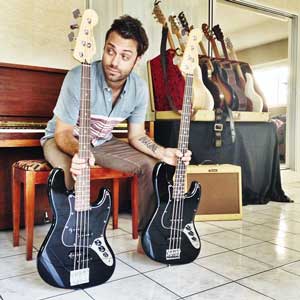
Black beauties: The Fender American Standard Jazz Bass, and a customized Blacktop with a neck and bridge P Bass pickup.
zZ: Well, it sounds great. When you say you tried a bunch of basses — does Fender show up and say “Here’s one of each of our new basses, pick one?”
MW: They sent me some that I asked for just for myself, outside of AWOL. I was like, “I’d really like a Jazz Bass, and I’m also looking for a custom bass that’s kind of in-between a J Bass and a P Bass.” A lot of people will have a P Bass with a J Bass pickup in the bridge as a custom thing, but they used to make these basses called Blacktops — but this thing is just two P Bass pickups, which I’ve never seen. So I tried that out, and it’s really cool — it’s a Mexican-made Fender bass, and it’s just got a raunchy sound if you want the deepness of a P bass, but you also want something to cut through if you’re shredding with overdrive or fuzz, and it’s got that bridge pickup in there. And that’s been fun.
Being in a new role that I’m not used to, just being the bass player — part of the perks is like, “Wow, it’s really easy to just sound fine and have fun without having a bunch of sh*t going on” — because in guitar world, I’m a psycho when it comes to nerding out about gear.
zZ: Tell me about transitioning from guitar from bass. Normally guitarists are like, “I’m the lead guitarist!” So it’s cool to hear someone say, “No, I really want to play bass. I want to be the glue.”
MW: I think it’s because I don’t identify with being a guitar player or a bass player. I like writing songs and I like production so much, and I love music so much, that I’m stoked to be a part of a song or a part of a show in any way that I can contribute something I feel I’m good enough to play. Guitar and bass are just those things I gravitate towards. If it’s a rock band, I usually gravitate toward guitar, obviously. But if it’s a pop band, or an R&B thing, or a Motown groovy thing, or soul music, I always want to play bass. And sometimes I can pick up either. It’s kind of like showing up to a jam session and being respectful and nice. Whatever’s needed — I don’t need to play guitar; I don’t need to play bass — I’ll just pick up whatever’s needed to help the song, and that makes me really happy.
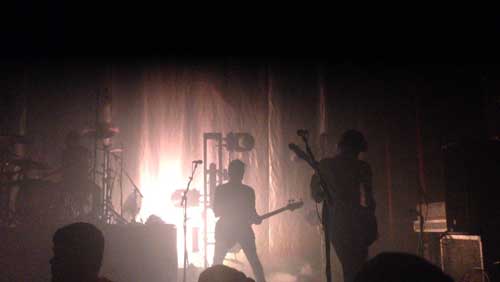
Walloch on stage with AWOLNATION at Chicago’s House of Blues. Photo: Maya Kuper
What It’s Like to Play Bass in Front of 20,000 Screaming Fans
zZ: You’re now playing bigger stages, and to consistently bigger audiences than you have in the past. Do you feel the energy of that larger crowd — especially with bass versus guitar?
MW: When I play bass, I definitely become a different person, instead of a guitarist who’s just got a bass on! And part of that’s like a calmer, chill persona. I kind of like being in the back with the drummer, and not performing out in front, like I used to as a guitar player. It keeps your adrenaline down; it keeps you calm — and if you’re in the rhythm section, that’s where you want to be, mentally.
zZ: “Calmer” and “chill” are not words that I would use to describe an AWOLNATION show.
MW: I don’t know if it’s because I’m playing bass, or if it’s because I’m on in-ears, but I played to 20,000 people the other night, and it didn’t feel as intense…on in-ears, there’s kind of a wall and a disconnect. I’m on a different world than the rest of the audience. Which is kind of a bummer at times, because I like connecting with people, you know? But it also keeps your adrenaline down, and it keeps you able to focus on what you’re doing, what you’re playing, and how you’re fitting in with the band. You’re able to nitpick at every little thing, and I’m probably getting better than I think because of that.
I’m playing a lot of the same venues I’ve played before with Company of Thieves — yeah, most of the AWOL crowds are bigger than what I’m used to, but I’ve played Lollapalooza, and big radio fests where there were a bunch of people for a bunch of different bands there. I think the biggest difference is just consistently headlining to 1000+ people every night, where I wasn’t doing that before. But because I’m in in-ears, and because I’m just playing bass in the back…I’m so happy to just jump up on stage and play music with a good band and get better at my instrument.
zZ: Maybe it’s actually a good thing that it’s not as intense, so you can work on locking in with the drummer, and not be high-fiving the audience.
MW: Sometimes I’m hungry to feel it — I’ll pull one of my in-ears off sometimes, and I hear them screaming “All I Need,” or “I Am.” And I’m like “Oh, that’s what’s happening right now? I don’t even know that that’s happening!” I don’t even feel it…so sometimes I’ll tell the monitor guy to keep turning up the ambient mics in my mix, so I feel like I’m at a show, and I can feel the air in the room, and the people. That helps sometimes.
zZ: I can tell you, even though you may not be able to hear it in your in-ears, the energy was through the roof in the House of Blues in Chicago. And I’m sure you’re seeing that everywhere you go.
MW: Every crowd has been like that — it looks like they need it, and they’re getting a release from the show. And that stokes me out. That’s really cool to see. In some of the really big places, usually it’s hard to feel energy, because there’s like 15,000 or 20,000 people in an arena — everyone’s there for other bands and it’s hard to feel the energy from that many people. But the night after Chicago, we played Kansas City, at this arena, and it was kind of insane! All the 20,000 people were there on the floor just flipping out the entire time, and I felt all those people’s energy. That never happens in a place that big. There’s definitely something going on with this band and the way they’re connecting with their audience.
zZ: It’s the fact that it’s not just a guy playing along to a bunch of tracks. It’s a real drum kit and a real bass player and a real guitarist.
MW: Yeah. I’m stoked on that. There’s definitely a different beast that happens with the band live, and Aaron’s allowing that to happen, and embracing it. And there’s a new riff every few days — like last night, at the end of “Run,” we just played the intro riff, like Rage Against the Machine would play it, or something. We didn’t do that the night before! And there’s always a new idea: “Oh, let’s do this tonight!” And we just try it at soundcheck and do it. The other night, we were all hanging out in the bus after our show before Chicago, and we were all just showing each other songs and having a listening party and loving all the music we were showing each other. One of the songs was a Christopher Cross song that [drummer] Issac played. The next morning we woke up, and we were like “We have to play that riff at the end of ‘Sail.'” So at the end of “Sail,” that’s what that was! There’s such a distinct style to the production — but it’s such a live band, though. It’s really cool.
zZ: You mentioned Rage Against the Machine. There’s a RATM T-shirt that says “All sounds made by guitar, bass, drums and vocals.” It’s kind of a dig at anything synth-based, but it’s also saying, “Rage Against the Machine are creative in how they use their guitars.”
MW: It’s like we’re in this age where guitars are really not cool. I think that happens once every decade — and it excites me, because instead of trying to get on the train of “Well, I’m not going to use guitars; I’m going to use keyboards,” I’m like “If guitars aren’t cool, I want to use guitars and fool people that guitars are even happening.” Kind of like Radiohead did when they first came out. How else can you use the instrument and make it new and different — and make all the people who think the instrument is stupid, get hip to it?
We’re in this age where guitars are really not cool…and to think they’re not cool anymore is kind of a joke to me. Let’s just figure out a way to do something with them that’s different; that hasn’t been done before!
zZ: Guitars will never really go away.
MW: That’s what I think. And to think they’re not cool anymore is kind of a joke to me. Let’s just figure out a cool way to do something with them that’s different; that hasn’t been done before! That’s what we have to keep doing.
zZ: That’s what you’re doing with your upcoming EP?
MW: It’s definitely a minimalist guitar record, but every guitar tone is just kind of hilarious and wacky. That’s what I’m trying to do — do different stuff with guitar sounds.
zZ: You’re singing, you’re playing guitar — are you playing everything on this EP?
MW: I’m playing everything except drums. Keyboards, bass, vocals, guitars, and all that stuff.
zZ: Sounds a little bit like an AWOLNATION!
MW: Except it’s definitely not a big modern-pop-sounding thing. It’s definitely a private, personal record. I would love to try to make another record that sounds more radio-friendly too, but this one just sounds more like Wilco, or Bon Iver — that kind of vein. I’m shooting to release a free single and video soon, and the EP sometime in October. You can keep up with all my updates on Instagram and Facebook!
Hear more from Marc at MarcWalloch.com
Main image credit: Mike Moll

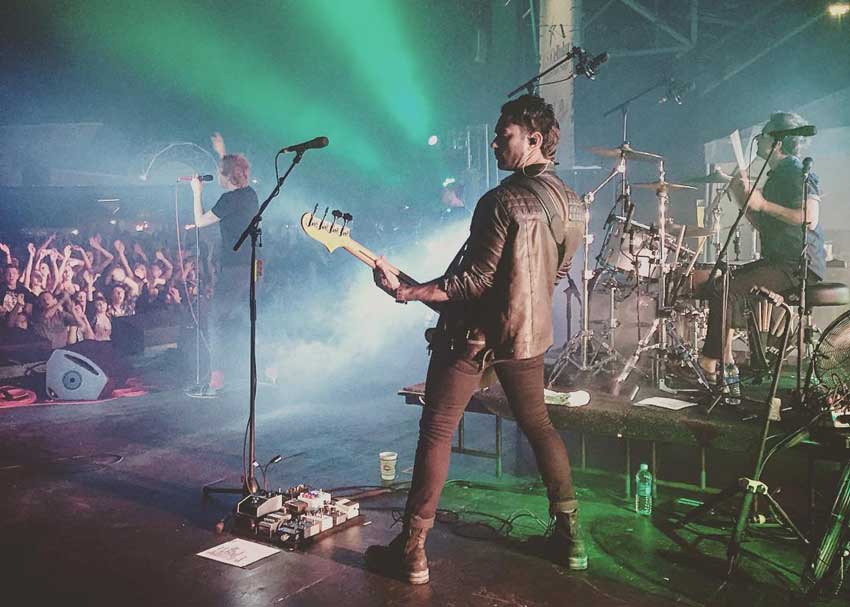

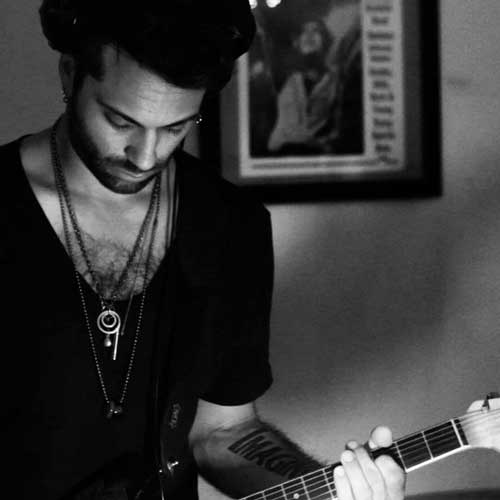
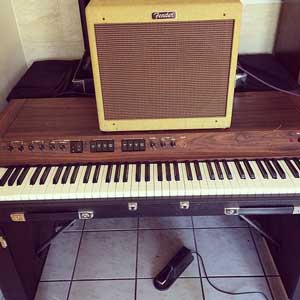

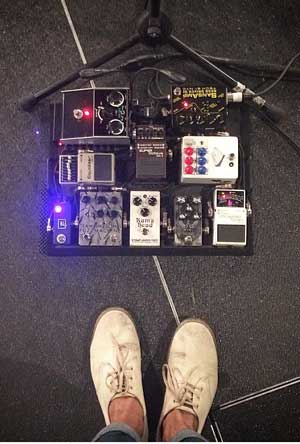
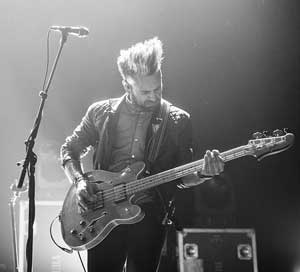
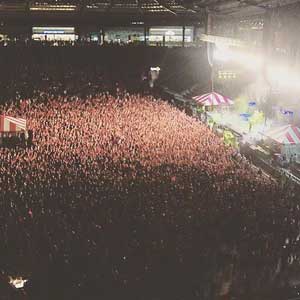


Leave a Reply